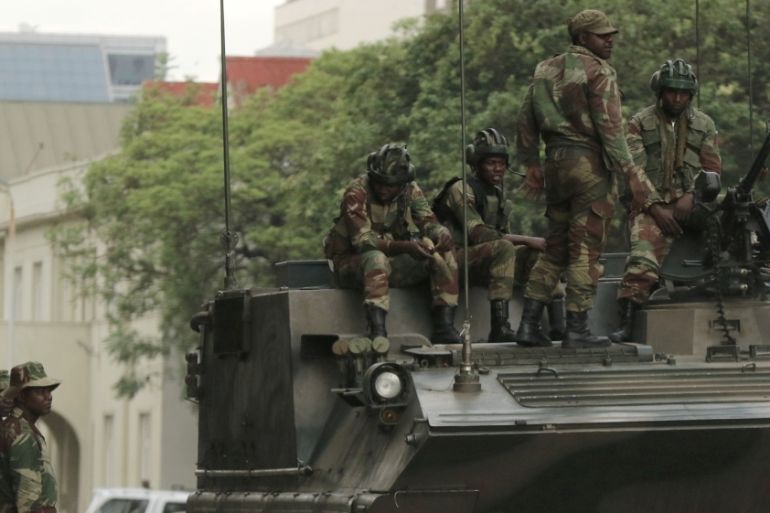Region bids for solution as crisis grips Zimbabwe
As military takeover enters second day, army blocks key sites as officials and citizens hope for peaceful resolve.

Harare, Zimbabwe – Zimbabwe entered its second day of a military takeover and President Robert Mugabe’s house arrest as local and regional efforts at resolving the crisis are under way.
A local mediation team that includes two government officials and a Catholic priest are reportedly involved in talks to find a solution to Mugabe’s confinement.
Regional dignitaries from the Southern African Development Community (SADC) are scheduled to meet to discuss the brewing crisis, in a gathering that will take place in neighbouring Botswana where the SADC is headquarters is located.
As current chairman of the regional economic bloc, South African President Jacob Zuma deployed South Africa’s Defence Minister Nosiviwe Mapisa-Nqakula and State Security Minister Bongani Bongo as his envoys.
|
|
The pair are expected to hold talks with President Mugabe and the army generals on Thursday to reinforce Zuma’s call for “calm and restraint” and caution against a full military takeover.
Although many Zimbabweans are hopeful for change from Mugabe’s 37-year rule, most people on the streets of Harare shy away from commenting on Mugabe’s house arrest.
Cletus Mubaiwa, 29, an electrical engineer, told Al Jazeera he hoped Mugabe’s impasse with the army would be resolved peacefully.
“As a Zimbabwean what I wish for is for peace, stability and economic change. I don’t want the political situation to get out of hand and for there to be serious violence that could lead to harassment of people and violations of human rights like we have seen before,” he said.
The army maintains its presence in the city centre guarding strategic sites remains such as the parliament, the courts, the Zanu-PF headquarters and the state broadcaster, ZBC TV.
Tanks around courts and parliament
At least two tanks with 14 armed officers in total could be seen parked around the courts and parliament. According to witnesses, yesterday, there was a brief altercation between three army officers and at least twenty police officers that normally guard parliament.
The confrontation resulted in the detention of the police. No police were visible outside parliament and hardly any could be seen around the city center where police often setup roadblocks.
Government offices that were shut yesterday have re-opened today in Harare and Bulawayo, the second city. Shops and schools are open, but the army has warned the public to restrict its movements to what’s necessary until the operation is over.
The army insists its action is not a coup, however, the regional and international community have raised concern at the military’s unprecedented move.
![A woman walks past newspaper advertising poster on the street in central Harare [Philimon Bulawayo/Reuters]](/wp-content/uploads/2017/11/728b07813b4c4d1c93f79e0f5ac03dc2_18.jpeg)
Several of Mugabe’s top ministers, including Minister of Finance Ignatius Chombo, are currently being detained by the army at the King George VI military barracks.
Zanu-PF spokesman and Minister of Information, Simon K. Moyo did not answer calls from Al Jazeera for comment on the state of those detained.
Zanu-PF National Youth League Secretary, Kudzanai Chipanga who is also being held at the military barracks publicly apologised to the Zimbabwe Defence Forces Commander General, Constantino Chiwenga, for castigating the general’s call for Mugabe to stop purges within the ruling party.
Mugabe’s recent dismissal of Vice President Emerson Mnangagwa and the suspension of his several allies sparked the military takeover.
“I kindly request General Chiwenga to please Sir accept my apologies on behalf of the Youth League and myself. We are still young people. We are still growing up and learning from our mistakes.
“From this big mistake we have learnt a lot,” he said in a statement broadcast on state television last night.
Chipanga stressed his apology was not coerced.
Britain, Zimbabwe’s former colonial power, is monitoring events closely and has urged for a peaceful outcome, warning that, in the event of a transition, power must not be passed from one tyrant to another.
“Nobody wants simply to see the transition from one unelected tyrant to a next. No one wants to see that.
“We want to see proper, free and fair elections,” Foreign Secretary Boris Johnson told the British parliament on Wednesday.
Follow Tendai on Twitter: @i_amten